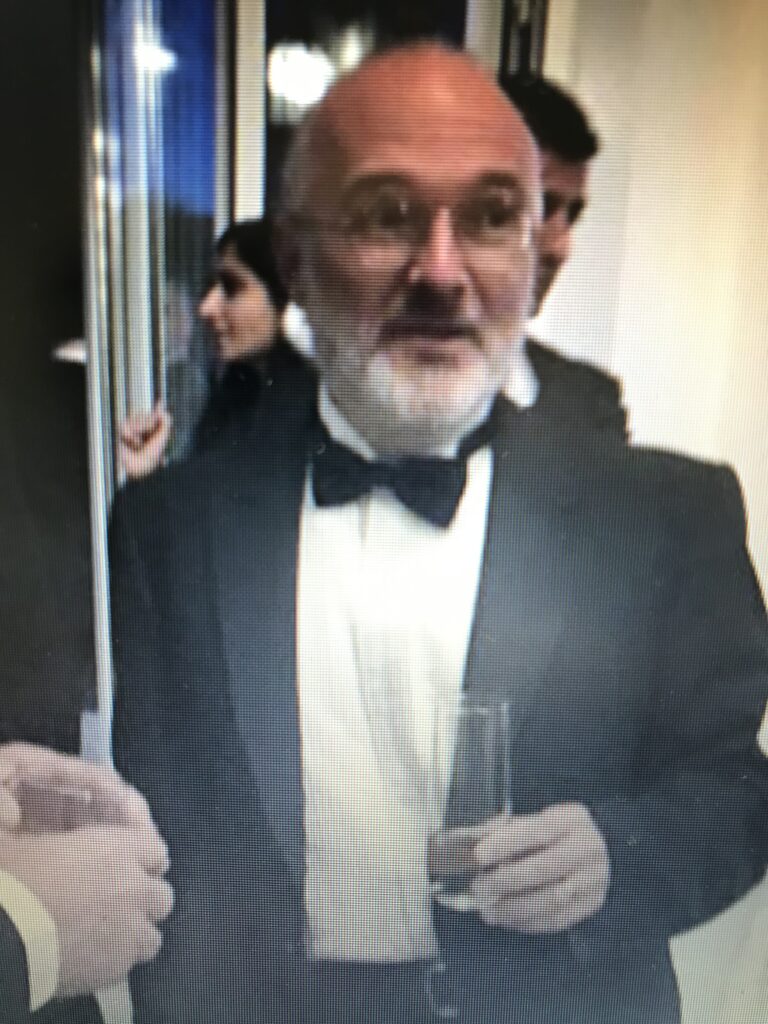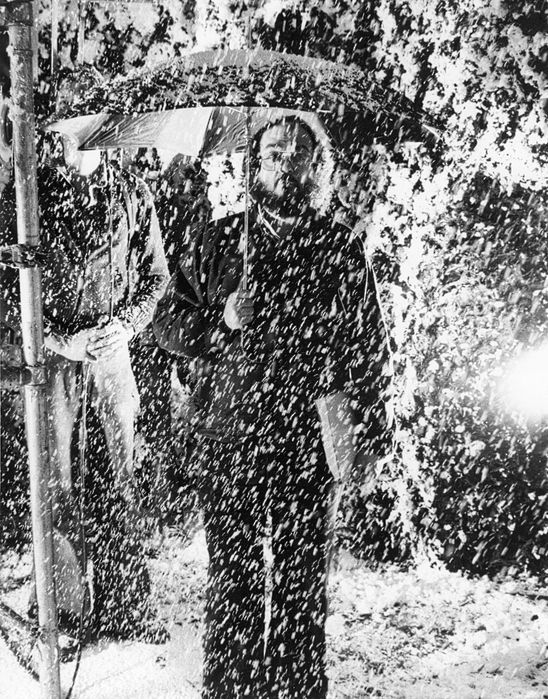BTG’s “EXTREMITIES” INTRODUCES THE COMPLEXITY OF RAPE … KAREN ALLEN DIRECTS AND CASTS AN OVERLAY UPON MOLLY CAMP … BUT IS RAPE “EXTREME” ENOUGH ANY LONGER? … THE PLANET REVIEWS A “GO SEE IT”
By DAN VALENTI
PLANET VALENTI Arts and Entertainment
(FORTRESS OF SOLITUDE, Tuesday, July 16, 2013) — Rape, the Musical!
Or perhaps, The 51st Shade of Gray might better describe the first scene of Extremities,” with a first beastly then humbled male forcing himself on a woman. The remaining scenes resemble a cross between Venus in Furs and Femdom for the men (and women) who want the women on top and in charge, dictating and wielding the fire poker and the insecticide with utter cruelty.
Crack! Crack! Oh, my stripy back!
As a title, Extremities, in its vague generality (what is not extreme today?), fails to put an accurate headline on this play. In the end, the action is not quite that “extreme” in playwright William Mastrosimes drama, now playing through July 27 at the Unicorn Theater on the Stockbridge campus of the Berkshire Theater Group and directed by original cast member of this play, Karen Allen.
It might have been “extreme” back in the early 80s, when this set piece was written. Oh, how we have become jaded, in this era when “strange” makes satire no longer possible. This play, set in 1980, resembles every bit of its age. It’s become dated. We sow. We reap. We are in 2013.
This is, nonetheless, a play worth seeing.
See it.
—– 00 —–
We are in a time when the erstwhile “extreme” now bears the label of “disease” or some other forgivable condition that removes all responsibility from everyone, no matter what they do. To qualify as “extreme” in 2013, an attempted rape doesn’t qualify. No … in this post- post-modern world, we want our violence truly Extreme, such as scores of innocent children gunned down in cold blood in a Connecticut grammar school, or a TV Food Network star admitting to using the word “nigger.”
Paula Dean‘s casual use of “nigger.” A one-syllable word. A playwright’s deliberate confrontation of “rape.” Another one-syllable word. Samey-same? Are we as a society capable of deliberating of such matters as a time when virtually all of popular culture, especially the branches that target young people, compete for vulgarity and ear-splitting? Or as the announcer might ask, “Now let’s pause for this commercial break.”
Will that word “rape” prompt outrage at a time when politicians steal us blind while the electorate stays away from the polls, luxuriating in the cop-out of apathy? We sleep. We snore. We deal with rape. We order a quarter pounder, extra onions.
To employ art in confronting such a complex issue as rape begs many more questions than answers, which BTG’s artistic director Kate McGuire bravely acknowledges. THE PLANET commends Maguire for staging this play and giving it to Allen, most noted for her movie roles in Raiders of the Lost Ark and Animal House. Allen’s stint in the original off-Broadway production no doubt provided sufficient simmering time for this play in her psyche, and her imprint is all over actress Molly Camp as Marjorie, so much so that we wonder if Allen didn’t artistically “force” herself on the young actress a jittery interpretation of this role that would otherwise not have come into being. THE PLANET imagines, for example, Eric Hill given the direction of Camp. We picture an entirely different interpretation.
“The mission of art is to show and to speak about what it means to be human, whether it’s dance, or visual art, or theater,” Macguire says. “Whatever the expression is, the artist is trying to speak about his or her experience of being human. So our responsibility is to have that conversation with out audience. Sometimes it’s a little lighter, a little easier to digest; sometimes it’s not so easy to digest. Sometimes it’s more provocative.” …
… As in Extremities. Of course, by inviting “conversations” with an audience, th artist must be prepared for back talk.
“She was asking for it.”
That defense of rape is about as politically correct as drunk driving, but, of course, many times that personal dynamic of fashion provokes a decidedly ugly personal situation in which a man, under warped biological influences he cannot control, takes advantage of a cleavaged woman, who doesn’t realize the effect her “liberation” may have on the opposite sex. The intriguing aspect of Extremities is that, in this play, the rape never happens. The would-be rapist is foiled. The woman turns the tables on him for a “crime” he does not commit. She ties him up with belts and cords, sticks him in the fireplace, and begins her torture of the would-be assaulter.
There is no rape in this play except what Marjorie inflicts upon Raul. There is no evidence of rape, except what Marjorie’s two roommates witness. Raul’s assault amounts to a “he said, she said.” Much like the George Zimmerman case, though, emotions take over, preventing rational disposition of the issue. The three women have a man caged and captured. In reality, one of them would immediately bolt form the apartment and call the authorities. This doesn’t happen. This is a play, which wants to use realism when its suitable only to ignore it when it deals with the actions of the players. Even the playwright, apparently, couldn’t decide on an outcome.
The would-be victim gets the advantage of Michael (Raul), the man, and proceeds to torture him. She binds him, binds him, and resigns him to the reciprocal role of quarry. The “victim” is unscathed, and the “aggressor” is victimized, but Marjorie is not willing to let justice to decide innocence or guilt. She seems to be enjoying her dominance over Raul.
—– 00 ——
On scenic designer John McDermott‘s beautiful set, Marjorie, played by a screechy and Allen-induced Molly Camp, lets a man into her apartment. Raul (James McMenamin), who pretends on a pretext that he has mistakenly called on the wrong home, steps inside the apartment and quickly accelerates the foisting of his unwanton attentions on Marjorie. He gets on top of her, forces her to say she wants his love and then falls preposterously victim to his own belt. Marjorie grabs it from the floor and puts a stranglehold on him. The lights go out. The next thing we see, Raul is bound and leashed inside a fireplace, with the grate in front forming a cage.
It’s a good thing the lights go out, because there’s no way the skinny Marjorie could overpower this powerful man in such a way. The audience, despite the realistic intentions of this play, is forced into the first of a series of unweildly suspensions of disbelief. The second occurs when we see Raul inside his cage. Why he doesn’t work the blindfold off his eyes, we don’t know. Why he doesn’t put the full weight of his girth against the flimsy fireplace grating, we don’t know — but then we do. It’s because if he did, which he would do in “real” life, there wouldn’t be a play. The third suspension of disbelief occurs when none of the three women, but especially Terry and Patricia, runs out to notify the authorities. The two witnessing women are accomplices in the torture of the man, yet neither has the presence to get help.
Right.
Marjorie proves to be quite dom. She douses Raul with gasoline, sprays his eyes with insect repellent, pours boiling water on him, puts a leash around his neck, and interrogates him, each time tugging viciously at the leash when his answers don’t please her. Who’s the “monster” here?
This is a question Marjorie’s two roommates, Terry (Kelly McCreary) and Patricia (Miriam Silverman) debate. McCreary and Silverman give solid, workmanlike performances, given that neither character does the sensible thing and goes to the police. Silverman, particularly, adds a beautiful touch of compassion and pathos when she expresses care and concern for the “victim.” She is the most believable of the characters, the most outstanding actor/actress in this production. Both women realize a sobering truth, that Marjorie, in her urge for vengeance, has become worse than her would-be tormenter.
Camp summons sufficient outrage at her ordeal, but soon, her performance becomes a one-note ditty. She begins to screech and shake. … then screech and shake … then screech and shake. … then … Her effect on the audience would be much more effective is she would “change speeds” — she starts to do that at play’s end, and it comes as a blessed relief.
McMenamin, as the abused, delivers a sufficiently be-grieved presentation. He has little to do except recite lines blindfolded and hogtied. Memory is all, but action is robbed. THE PLANET wonders if, facing four women (Allen and the three actresses), the man had much say in the staging and development of this piece. We suspect much, and that is a credit to Allen, who makes the wise choice of not taking sides in this tough case.
“Much of Extremities deals with our violent nature,” says Maguire. “It also deals with the issues of how men and women speak to each other, how they act with each other, and who’s going to get the best of each other. It’s one of those plays that provokes and brings up things about each one of us that we often don’t like to face.”
Indeed. An informational poster board in the Unicorn lobby on the subject of rape tells us that 9 in 10 rape victims are women. A man, if he honest, reading this will think: “Lucky bastard” of that one in 10, for sex, in the eyes of men, is a biological imperative, practically an entitlement, hardwired into us going back into prehistory, when the most urgent need was to populate the earth with new people who would grow up to perform the rugged manual labor needed to keep the species alive so that we would not go the way of Australopithicus. Women in 2013 may have a hard time accepting that truth, and men may not know any better than to express it in some form. No wonder the “dialogue” between the sexes is usually delivered like canon shots across personal bows.
Fortunately, because men were not monogamous and the “civilized” restrictions of marriage did not impose a false “morality” on the urge to freely replicate, human beings did not end up as an extinct genus of hominids. That’s little solace in 2013, when political correctness has shackled the expressive of language every bit as much as Raul finds himself tied up in a fireplace.
Women see rape differently … we think. Is rape a secret female desire? Is it an indictable offense to even ask the question? So be it. But we wonder if that is why the poorly written garbage novel 50 Shades of Gray has gone through a jillion printings. Men aren’t buying that trash, and make sure you perform a demographic reading on who sees the film, men or women!
Men simply cannot understand the trauma of rape. We want to tell Marjorie, “Listen, kid. Nothing happened. You were threatened. You’ve blinded this dude. Let it go.” It’s not so easy, the women tell us. We don’t get why, but that is the case. It’s not so easy for a woman to let go.
—– 00 —–
Extremities
directed by Karen Allen
at The Unicorn Theatre
Previews July 11 – July 12
Opens July 13 8pm; Closes July 27
Tickets: Preview: $35;
A: $45
Sponsored by Howard and Natalie Shawn
Named a Critic’s Pick by the Boston Globe!
In William Mastrosimone’s psychological thriller, a young woman is violently attacked in her own home. However, once the tables turn,Extremities raises provocative and difficult questions about rape and its aftermath, violence and its justification, justice and its reliability. Who will be held responsible in this riveting game of cat and mouse? Directed by original cast member, Karen Allen.
Extremities Cast:
Marjorie: Molly Camp
Terry: Kelly McCreary
Raul: James McMenamin
Patricia: Miriam Silverman
Performance Dates
Thursday, July 11 at 8pm (Preview)
Friday, July 12 at 8pm (Preview)
Saturday, July 13 at 2pm
Saturday, July 13 at 8pm (Opening/Press Night)
Monday, July 15 at 8pm
Tuesday, July 16 at 8pm
Wednesday, July 17 at 7pm
Thursday, July 18 at 8pm
Friday, July 19 at 8pm
Saturday, July 20 at 2pm
Saturday, July 20 at 8pm
Monday, July 22 at 8pm
Tuesday, July 23 at 8pm
Wednesday, July 24 at 7pm
Thursday, July 25 at 8pm
Friday, July 26 at 8pm
Saturday, July 27 at 2pm
Saturday, July 27 at 8pm
————————————————————————————-
“There in the tomb the dark grows blacker, / But the wind comes up from the shore: / They shake when the winds roar, / Old bones upon the mountain shake.” — W. B. Yeats, final verse, “The Black Tower,” final verse.















Karen Allen has delivered a powerful play. As the reviewer says, “See it.” To me this is the purpose of theater, this encounter with issues.
,,,,,the purpose of the theatre is to create high paying director jobs, provide cheap wages for workers,and to fill restaurant seats ie,,,, it’s junk, pure and simple. We have some great actors on north street though,,,,,,,,
T
I understand from where you are coming with this. Theatre CAN be what you say. In the case of BTG, S&Co., and BSC, the purpose is to create art in this medium. We must understand that art begins with an “artist,” usually a man or a woman who creates in a medium (painting, theater, writing, etc.) for no other purpose that to express something about human experience. I realize that this endeavor can be overtalked” and “oversold,” but live theater, especially when well done, is still a worthwhile, diversionary pursuit.
Of course Bianchi is Isn’t meeting any challenge for mayor, the g o b couldn’t have found a candidate as good for them as Bianchi.